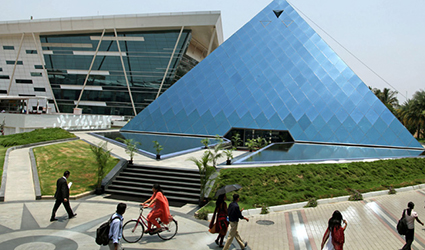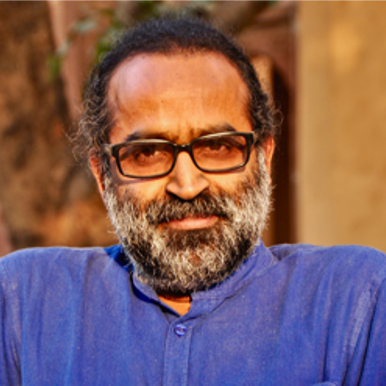Building Culture – Building Hope


Santhosh Babu
Years ago, on a flight from Nairobi to Mumbai, a bright management consultant who was traveling with me said, “I want to quit my job because all I am doing is making my client (he mentioned the name of the promoter) richer and richer without really making any impact on the overall progress of society.” He looked a little lost, mixed with an expression of profound satisfaction at being able to spill it out to me.
How do we build societies and organizations that are responsible for the overall wellness of humanity, while creating more meaning and happiness for all stakeholders?
“Built to Last” and “Good to Great” have been common names for many of the top team alignment and visioning workshops that I have done for organizations. Many organizations mentioned in books like ‘Built to Last’ have perished or stopped growing. Most studies about successful organizations are, and will have to be largely backward looking: what have companies done to become successful? While understanding the past is valuable to create our hypothesis we must also look at what kind of culture will help organizations and societies in current and future times.
Culture consists of group norms of behaviour and the underlying shared values that help keep those norms in place. The culture of an organization or even a nation is built on certain assumptions that the leaders articulate and communicate well. Where does culture come from? It usually comes from the founders of the group. For whatever reason, they value certain things and behave in ways that seem to help the group succeed.
So the Infosys culture will have an influence of N. R. Narayana Murthy’s values and the Tata Group over the years has created a distinctive organization culture that differentiates them from other companies. What are our assumptions and our approaches to economic growth, sustainability and individual growth and would these assumptions create a culture where everyone finds meaning and happiness?
One of the assumptions many organizations and countries make is that the operation of a free market, unfettered by social and political regulations, would improve the quality of life for everyone. As a result, our mental model of how the world works has become one in which production and consumption, the twin poles of economics, are the benchmarks of prosperity and well being. If we operate from this assumption, our behaviour will be influenced by this assumption and this will influence the culture that we create.
An oversimplified way of looking at building a culture that could create a meaningful existence for everyone will be to look at three aspects of being:
Mindfulness of Self: This is about how one relates to the self and finds self-expression. Individual stakeholders in an organization and society need to grow, feel they are valued, feel their needs are taken care of and they are getting back what they want in return for what they give. In any situation, if you feel your needs are not taken care and you live for others by sacrificing your needs, at some point in life you will feel bitter about it.
At the same time if you focus completely on yourself and your profits, returns and your needs alone, without bothering about others you become a self-obsessed narcissist. Narcissistic leaders might focus on short-term results forgetting long term impact and many a time do not demonstrate inclusive thinking. Human beings are happiest when doing what they do best. This is actually true for animals also. Dogs bred to tend sheep are most content when herding and dogs bred to retrieve are most happy when they retrieve. So the culture needs to allow growth, expression and opportunity to do what one loves to do.
Mindfulness of Others: This is about the way we connect with others. One cannot experience happiness just by focusing on the self or when there’s a disconnect between the self and others. Credit Suisse Research Institute said in their world wealth report that the richest 10 per cent own 86 per cent of the wealth and the top one per cent alone own 46 per cent of all global assets. So when an organization produces things that have no apparent value for others, it is not focusing on others. When an organization focuses solely on its growth and ends up polluting the environment and depleting natural resources, it is not focusing on others. Similarly when a country embarks on a developmental journey that creates a huge divide between the rich and the poor, it is not focusing on others. At the same time, if one only focuses on others without taking care of self-needs, life is never fulfilling. Organizational culture needs to reflect care, empathy and support to its stakeholders.
Mindfulness of Purpose: Individuals, organizations and nations need to articulate a bigger purpose of existence. Leaders who can articulate the bigger purpose for collective development will energize the system and create long-term positive impact. A bigger purpose helps us focus on long-term sustainability rather than short-term success. The purpose statement of the Tata Group says, “We are committed to improving the quality of life of the communities we serve. We do this by striving for leadership and global competitiveness in the business sectors in which we operate. Our practice of returning to society what we earn evokes trust among consumers, employees, shareholders and the community. We are committed to protecting this heritage of leadership with trust through the manner in which we conduct our business.”
One of the ways by which TATA built its culture is by translating this purpose statement into demonstrated behaviour. Sometimes one gets overly focused only on the purpose and forgets to take care of the self or others in the process. A suicide bomber would be an apt example. Or a CEO who gets burned out and becomes ineffective.
So how would you build a culture that takes care of Self, Others and the bigger Purpose? As culture is built and changed by leaders, what kind of culture will our new Prime Minister Narendra Modi build? Bhutan has done something amazing by coining and adapting the Gross National Happiness (GNH) index. GNH has four pillars: the promotion of equitable and sustainable socio-economic development; preservation and promotion of cultural values; conservation of the natural environment; and establishment of good governance.
Under a new Constitution, government programmes “from agriculture to transportation to foreign trade” must be judged not by the economic benefits they may offer but by the happiness they produce. Maybe we can learn a thing or two from them!
From the India Shining campaign in 2004 to the development and growth sound bites we heard during this year’s elections, we need to now move towards a clear articulation of the culture we will build and the assumptions we will nurture going forward.
Please click here to download the latest OD PUBLICATION.

